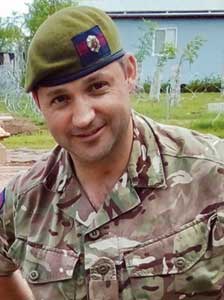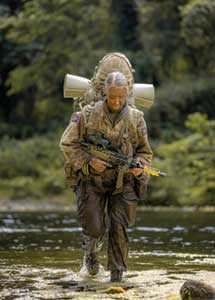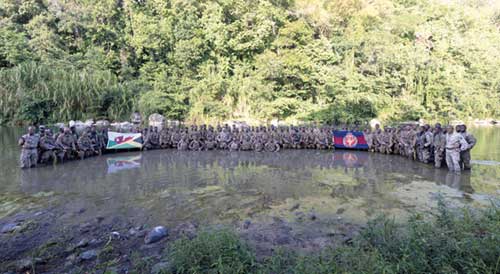|
REFLECTIONS OF A COLDSTREAMER IN COMMAND OF A WELSH GUARDS COMPANY
by Major Piers Gambarini
Coldstream Guards
|
My time as Company Commander No 2 Company Welsh Guards has encapsulated major State Ceremonial events including HM Queen Elizabeth’s Funeral, HM King Charles’s Coronation, as well as routine training both in the UK and in Jamaica and the US.

Major Piers Gambarini,
Coldstream Guards |
‘Bore Da Sir, Croeso i’r Gwachldu Cymraeg’ were the words that bellowed from a charismatic warrant officer as I walked past the Sergeants’ Mess in Combermere Barracks on my first day as a company commander. Intrigued and not understanding the words, I was then greeted again with the same statement in English: ‘Good Morning Sir, welcome to the Welsh Guards’. It set the tone for the next two years and reiterated the Welsh Guards’ family ethos with ‘Welsh’ at its core.
Fiercely loyal, emotive and patriotic, Welsh Guardsmen are almost exclusively from Wales, forming a naturally strong culture underpinned by their ethos, driving the Battalion forward on a daily basis. It was clear that morale played an intrinsically important role within the Welsh Guards and to maximise output, I recognised that humour, trust, mission command, and excellence in the basics were vital ingredients to build and maintain unit cohesion.
As I was finding my feet within 11 Brigade and the Welsh Guards, I was tasked to form a training team as part of the British-led effort to train Armed Forces of Ukraine (AFU) recruits for six months. In a shortened timeframe, we were expected to turn complete civilians into frontline soldiers. Welsh Guards instructors were split down into four training teams, each taking groups of AFU through an intensive course. This was initially a three-week course, however, to closely reflect the exigencies of the war, unnecessary elements were removed and serials including urban training, trench fighting, and anti-armour were added, extending the training package to five weeks. The instructors had to be agile to redesign the training programme and proved to be even more flexible to amend it on the move. Training complexity was increased as instructors were required to pass on their knowledge through interpreters who often had no formal training yet alone an understanding of military lexicon.
Fresh faced and with no prior knowledge of my training team, I relied heavily on trust in individuals to take ownership of the tasks within the constraints laid out. In the words of Dwight Eisenhower, ‘tell people what you want doing, not how to achieve it, and you will be amazed by their creativity’ and I was continually impressed by the attitude and resourcefulness of the non-commissioned officers delivering the training. In a short space, they had adapted lessons to meet the requirements and delivered safe and credible training that undoubtedly increased survivability and lethality. In total, 600 AFU soldiers were trained, and it was extremely humbling to be part of this, contributing to Ukraine’s ability to fight an aggressor on Ukrainian territory.
No sooner had the Battalion transitioned from 11 Brigade to London District in January 2023, 2 Company embarked on an overseas jungle exercise to Jamaica. Exercise RED STRIPE is the Jamaican Defence Force (JDF) hosted exercise based on a reciprocal arrangement with the UK which had been dormant for 15 years. Reinvigorated in 2022, the austere nature of the jungle provided a perfect training opportunity to test basic soldering and administration skills in arguably the most challenging environment. At a tactical level, the Company was able to progress through the stages of an operational deployment, from planning to occupying a firm base through to tactical action in unfamiliar territory. The Jamaicans were extremely accommodating and threw plentiful resources at the exercise to make it a career defining moment for all. We were routinely lifted into the jungle by helicopter, creating a sense of complete isolation and emphasising the requirement for robust navigational skills.
Structured in three distinct phases, (basic, platoon training, live firing) the training gradually increased in complexity once the basics had been mastered. The live firing phase was arguably the most rewarding and a consolidation of the previous two phases which tested the troops’ from individual firing up to a live section camp attack.

A member of No 2 Company fording a river on Exercise RED STRIPE. Jamaica, January 2023
|
Whilst in the jungle, the Guardsmen were subjected to dangerous environments that are inherently ambiguous, uncertain, and unexpected. Individuals are reliant on each other to operate and function, often trusted to make decisions independently or in small groups.
After a challenging exercise, returning to a British winter, was always going to be hard. Our morale, with the prospect of up to two years of Ceremonial Duties. However, the Company bond formed in Jamaica fostered a strong sense of duty, teamwork, trust, accountability, and continuous improvement which eased the transition from ‘green to scarlet’, reinforcing the dual nature of our role as Guardsmen.
State Ceremonial and Public Duties dominated a large proportion of my time in command. As the Army is required to do ‘more with less,’ many State events that would have traditionally had more resources were picked up solely by the Welsh Guards. The single battalion on the ‘blue line’ at any one time has resulted in an increased requirement for Guardsmen to be agile and step from the trees in Jamaica to the parade square in a matter of days. Whilst variety remains the ‘spice of life’, motivating and inspiring young and enthusiastic soldiers has always been challenging.
Reflecting on a busy, yet fulfilling two years, I was incredibly fortunate to take part in many significant events. I reflect that mission command and trust are essential at all levels. It enables junior team members to take responsibility early in their career and engenders initiative and ownership of tasks. Whilst young commanders are trained in Brecon on the section commander’s battle course, they are entrusted with the freedom to deliver on operations that are not akin to the freedom in barracks. It is the robust and thorough nature of our training and promotional courses that enable us to trust our people to routinely deliver and must inspire and trust junior commanders equally in barracks.
Organisational culture sets the tone, but knowing individuals’ motivations supports driving teams forward. The Welsh Guards have a strong ethos and culture which permeates through all ranks. It is the humour and camaraderie built from this that inspires others to go the extra mile in support of the team. Individuals have personal motivations which might not always be akin to another but each person has a role to perform. Empower each in the chain of command to actively understand their team members’ motivations. There is no prescribed way of understanding other than ‘knowing your team.’ Look after your people and they will look after you.

No 2 Company on Exercise RED STRIPE. Jamaica, January 2023
|
Whilst the Welsh Guards has a defined culture, this is underpinned by the Household Division’s ethos that drives discipline and standards both in the field and on the parade square. It builds cohesive and functioning teams based on attention to detail and precision required for high profile, no-fail State events. It stems from robust training courses delivered by Household Division instructors at the core. Each of the seven regiments have their unique customs and ethos, however it is the overarching Household Division culture that enables unity between the seven regiments enabling individuals to serve with any of these regiments. Maintenance of morale might not be the first principle of war but at times it could be the most important one. |
|



